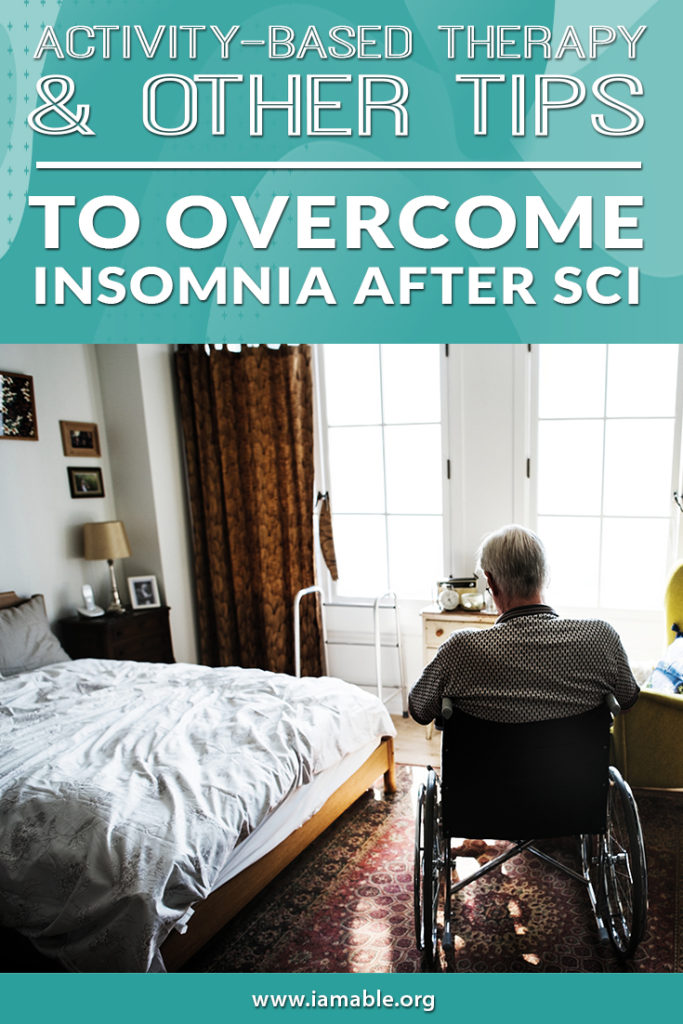Miami, FL 33186

There are years of research relating to the link between spinal cord injuries and insomnia. Whether it is pain, changes to circadian rhythm, or difficulty finding a comfortable position that is keeping you awake, lack of sleep only adds to your other symptoms. If you are living with an SCI, how can you cope with this additional problem? Let’s take a look at six tips, concluding with activity-based therapy. Each of these tips will provide you with another way to fight insomnia after SCI.
Melatonin is a neurotransmitter that releases in the body a couple of hours before you go to sleep. Since this is something that your body naturally produces, it shouldn’t have adverse side effects. The only problem is that taking a supplement every night may stop your body from making its own. As a result, you can’t use it daily. Many people, however, take melatonin supplements to combat an occasional night of insomnia.
Your body knows when to prepare for sleep based on when the sun is up. However, blue light from tablets, smartphones, and other screens can trick the body into thinking it is still daytime. Therefore, it is essential to stop the use of screens about an hour before bed. This ensures that the body will start the proper processes to put you to sleep. Getting some sun during the middle of the day is also optimal for helping the body keep track with its internal clock (circadian rhythm).
Therefore, it may be vital to have a hobby you can enjoy before bed as a part of your evening ritual of falling asleep. For example, reading is an excellent way to avoid looking at your phone or watching TV. You may want to charge your device in a different room at night to remove the temptation to check social media or use your phone in other ways that could be affecting your sleep.
Using the right pillow can help you to fall asleep and stay asleep. It can also help you to wake up without as much pain in your neck. Of course, the type of pillow that will work best often relates to your sleep position. Therefore, if you have trouble getting comfortable, you may need a few different pillows that you can swap out depending on which sleep position works for you that night.
Back or side sleeping is best for your spine, so if you are recovering from an SCI, you will likely need to avoid sleeping on your stomach. If you sleep on your back, try a softer pillow for your head. You may also be able to relieve strain from your back by keeping a pillow behind your knees. If you sleep on your side, use a medium firmness pillow. You can use a second thinner pillow between your legs. This will keep your upper leg from sliding forward or back and twisting the spine.
This means more than just finding a comfortable sleep position and pillow. It also involves more than keeping screens off before sleep. A restful sleep environment includes room temperature, limiting any light in the room, and controlling sounds. If you live in a noisy neighborhood, you may want to use white noise to block out the sounds of the city.
A comfy sleep environment also means calming your mind. Therefore, a part of your sleep routine may involve mindfulness or meditation. Positive thoughts, rather than just trying to clear your mind completely, may help you to drift peacefully off to sleep.
You can enjoy your morning cup of coffee and still sleep at night. However, if you are having problems with insomnia, you will want to avoid caffeine within six hours of bedtime. This includes coffee, cola, and other common sources of caffeine.
Exercise is always going to help you feel better at the end of the day. It produces hormones in the body that make you feel good. It also benefits your heart and lung health. Of course, exercising too close to bedtime may actually wake you up. However, as long as you avoid exercising right before bed, aerobic activity should help with insomnia.
This makes activity-based therapy (ABT) a win-win for SCI survivors. ABT focuses on promoting neuromuscular function by means of exercise. This can include things like intense physical therapy sessions, use of a functional electrical stimulation (FES) cycle, or Lokomat therapy. These are forms of activity-based therapy that target the neuromuscular system to provide the best patient outcomes. They can help to restore maximum function while also helping to maintain bone density, muscle mass, and existing range of motion.
With the help of activity-based therapy and the other tips in this article, you may find that your insomnia is manageable. Now let’s talk a little bit about staying focused on your recovery.
At iAM ABLE, our commitment is to help SCI survivors learn to thrive. One way we do this, even for people who cannot come to our Miami facility, is through an eBook entitled 7 Unbelievably Important Steps to Take to Thrive after Paralysis. The book can help you to prepare mentally for your recovery journey. You may not be able to do everything the way you once did, but you can still improve your independence and find joy in life. Let us help show you the way!
Grab our free e-book 7 Unbelievably Important Steps to Take to THRIVE after Paralysis by clicking the image below.
